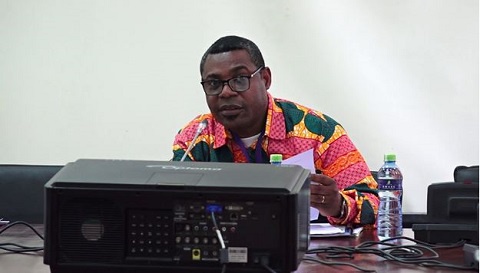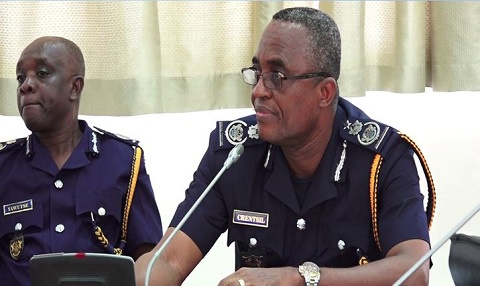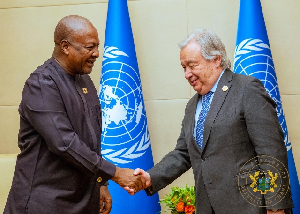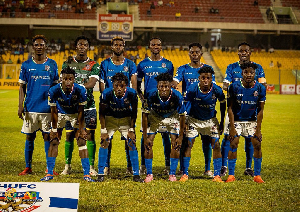Business News of Thursday, 22 February 2018
Source: EOP
Trade, Industry and Tourism Committee engages stakeholders on paperless directive
The Parliamentary Select Committee on Trade, Industry and Tourism has held its second stakeholders’ engagement to offer a platform for organizations involved in the paperless clearance process at the country’s ports to brief the committee on how they have implemented the paperless policy so far.
Ato Panford, Vice Chairman of the Parliamentary Select Committee to Trade, Industry and Tourism said, “We believe it is about time for us to take stock to inform ourselves, to know what the challenges are, what are possible suggestions to rectify any challenges therein. So that we can continue to have a successful policy program.”
It would be recalled that the Vice President, Dr. Mahamudu Bawumia at a Port efficiency conference in May 2017 issued 3 directives which included the removal of all customs barriers on the transit corridor, joint inspection at the ports and operating a paperless port.
All the directives which were to improve efficiency at the ports and reduce time of clearance took effect on 1st September 2017.
According to the Vice Chairman of the Parliamentary Select Committee on Trade, Industry and Tourism, Ato Panford, who doubles as the Member of Parliament for Shama, the engagement has become necessary to assess some challenges regarding the implementation of the paperless policy so that some solutions would be proffered.
The Customs Division of the Ghana Revenue Authority admitted that there have been some challenges associated with the Joint Inspections at the Ports.
“That facility is not working well. What it is supposed to do is to allow the trader to schedule examination and inform first, the custom officers, secondly, the terminal operator, thirdly, of there are any other regulatory agencies like Food and Drugs Authority, to inform them that one is ready for examination at this time and place and therefore inviting you. Sometimes the information doesn’t flow through".
However, the Commissioner of Customs, Isaac Crentsil asserted that the paperless system since its implementation has sealed some revenue leakages.

“When the paperless project came in, so many of these weaknesses were sealed because with respect to compliance we thought it was very important that we move the compliance out of the face of our other stakeholders because so many things were happening at that level. So the first place to move them to is the Customs Headquarters in Accra to prevent them from influencing or manipulating our officers,” he said.
Carl Sackey, Product Development Manager, Ghana Community Network Services, (GCNet) outlined some challenges they have identified.
“There are many other agencies also operating, therefore, once the clearance release has been done, they also stop the agents and ask for stamped entries to show that the consignment has been released,” Carl Sackey shared.
He said GCNet is working with other stakeholders to ensure that challenges in the clearance process are addressed.
“GRA has actually set up a committee as well involving all the stakeholders to review the clearance process to be able to iron out some of the challenges we have talked about here,” he stated.
From the perspective of the freight forwarders, inadequate training and transmission of data issues were some of the challenges the committee identified.
“The first and foremost challenge was the issue of training because there was not enough time for training the users of the system. Here, I’m talking about the agents themselves. So, most of what we do were a bit ad-hoc” A GIFF official said.
The committee sought to know if GPHA has access to monitor the tariffs charged by other service providers.
Member of Parliament for Tamale Central, Inusah Fuseini enquired if GPHA has a reasonable system that accesses services of all the service providers at the port or how taxes, levies and fees can be charged which is consistent with the services provided.

An IT Officer at GPHA, Francis Marfo responded that “I have not come across the issue were customers are raising concerns with MPS tariffs so I have not been able to examine or compare the rate but from here we will do that.”
He continued that “what we do is that when MPS releases the containers to our terminals areas, we do not unpack anything from the container, therefore we do not charge the partial. We are only cutting seal and allowing the customs officers to site so our charges are considerably low. So that’s how we are operating. For all our terminal areas, that is exactly what we are doing. Everything is from the tariff and it is transparent to the freight forwarders,” he added.
The committee tasked GPHA to ensure that charges by some service providers which are not consistent with GPHA approved tariffs are scrapped.
“It is in your ultimate interest that the cost of doing business in Ghana below”, Inusa Fuseini, MP, advised.
The IT Officer at GPHA, Francis Marfo assured the committee that he will furnish them with tariffs of the various service providers as soon as possible.












